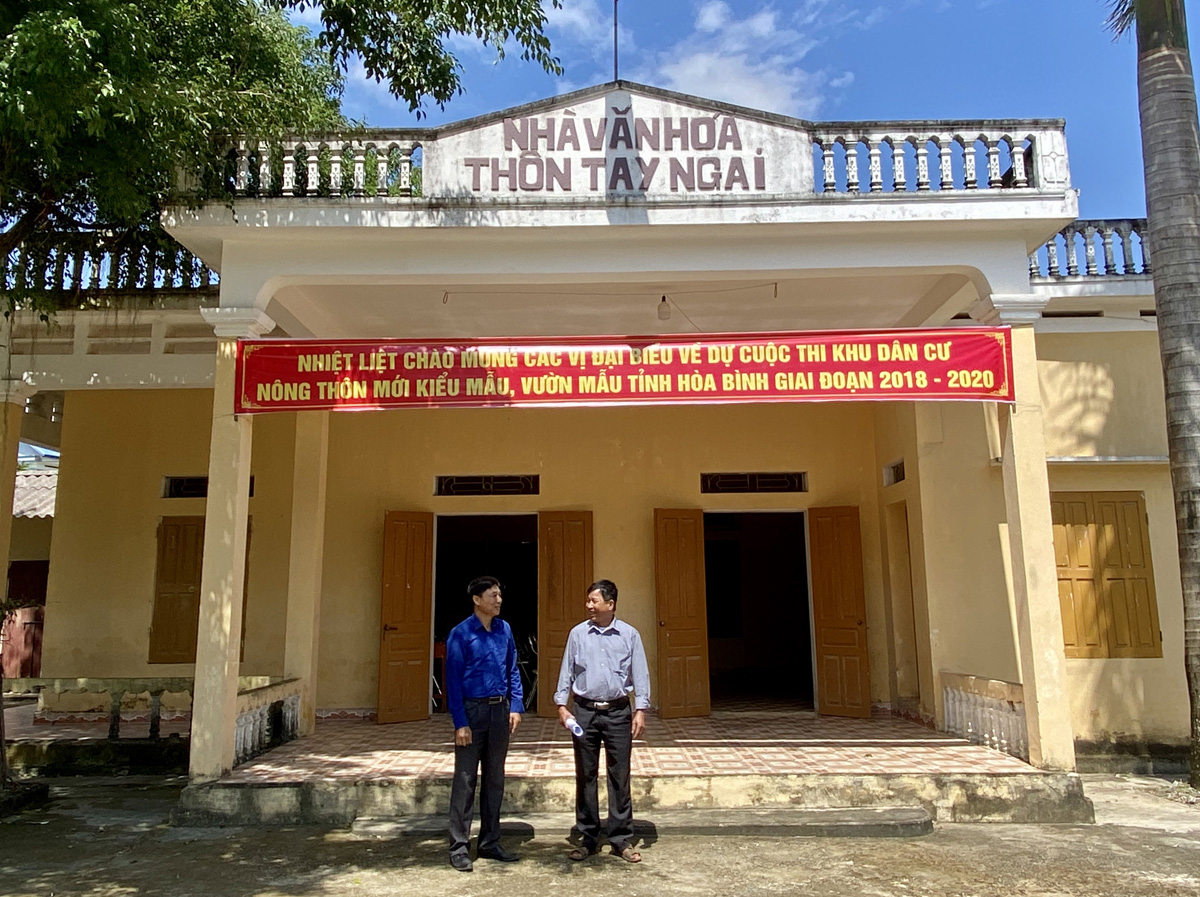
(HBO) - In recent years, the investment in building and completing the cultural institutions in Lac Thuy district has always been paid attention to and directed by the Party Committee and the authorities. Up to now, the percentage of the villages, the hamlets and the residential areas having cultural houses has reached 97.8%. However, the number of the cultural houses meeting the prescribed standards is only nearly 50%, the rest have deteriorated, damaged, broken or lacked synchronization.
 The cultural house of
Tay Ngai village (old), now it is the cultural house of Ngai Long village, Chi
Ne town (Lac Thuy) was built in a low-lying location, frequently flooded, and
is currently proposing to be built.
The cultural house of
Tay Ngai village (old), now it is the cultural house of Ngai Long village, Chi
Ne town (Lac Thuy) was built in a low-lying location, frequently flooded, and
is currently proposing to be built.
After merging villages, hamlets and
residential areas in the localities, a lot of cultural houses do not guarantee
the size of area, equipment to operate according to the regulations. To
overcome the above situation, each locality, basing on the actual situation,
has flexible solutions to overcome difficulties in exploiting and using the
cultural houses after merger in the most optimal way.
The People's Committee of the district has
issued a project to support the budget to construct, repair and upgrade the
cultural houses of the villages and the residential areas in the locality in
the period of 2019 - 2021. Accordingly, the villages and the residential areas
that do not have cultural houses or the cultural houses have been degraded, the
area has not met the requirements, they are not qualified according to the
criteria of the new rural areas, the people in the village or residential areas
voluntarily contribute to building cultural houses will be supported with funding.
The priority is given to the villages belonging to communes registering to
complete building new rural areas and the cultural houses in the villages and
the residential areas after merger are no longer suitable or do not meet the
local requirements. During this period, the district plans to repair 24
cultural houses, build 47 new cultural houses with the support level from
30-100 million VND each cultural house.
The communes and the towns with the financial
support of the State, the consent of the People and from the sources of
socialization, many cultural houses of the villages, the hamlets and the
residential areas have been repaired, upgraded and newly built. The cultural
houses have been invested in building, putting into use and step by step exploiting
and promoting the effectiveness of the local political tasks. They are the
places to organize the cultural, sports and entertainment activities, meeting
the people's creative needs, enjoying the spiritual culture, and improving the
people's physical condition.
With an increasingly vibrant and widespread emulation movement aimed at building cultured residential areas and cultured families, Yen Thuy District has been making steady progress toward improving both the material and spiritual well-being of its people, while fostering a civilized, prosperous, beautiful, and progressive community.
Once lacking recreational spaces and community facilities, Residential Group 2 in Quynh Lam Ward (Hoa Binh City) has recently received attention for the construction of a new, spacious, and fully equipped cultural house. The project followed the model of state support combined with public contributions in both labor and funding.
The "All people unite to build cultural life" movement, which has been effectively integrated with Kim Boi district’s socio-economic development goals, is fostering a lively spirit of emulation across local residential areas, hamlets, villages, public agencies, and enterprises. In addition, through the initiative, traditional cultural values are being preserved and promoted, while community solidarity and mutual support in poverty reduction and economic development are being strengthened.
A working delegation of the Hoa Binh provincial People’s Committee led by its Permanent Vice Chairman Nguyen Van Toan on June 11 inspected the progress of a project to build the Mo Muong Cultural Heritage Conservation Space linked to tourism services in Hop Phong commune, Cao Phong district.
Born and growing in the heroic land of Muong Dong, Dinh Thi Kieu Dung, a resident in Bo town of Kim Boi district, in her childhood was nurtured by the sweet lullabies of her grandmother and mother. These melodies deeply imprinted on her soul, becoming an inseparable part of her love for her ethnic group's culture. For over 20 years, this love for her hometown has driven Dung to research, collect, and pass down the cultural values of the Muong people to future generations.
In the final days of May, the Ethnic Art Troupe of Hoa Binh Province organized performances to serve the people in remote, mountainous, and particularly disadvantaged areas within the province. These were not just ordinary artistic shows, but they were the meaningful journeys aimed at spreading cultural values, enhancing the spiritual life of the people and contributing to the preservation of ethnic minority cultural identities.



 The cultural house of
Tay Ngai village (old), now it is the cultural house of Ngai Long village, Chi
Ne town (Lac Thuy) was built in a low-lying location, frequently flooded, and
is currently proposing to be built.
The cultural house of
Tay Ngai village (old), now it is the cultural house of Ngai Long village, Chi
Ne town (Lac Thuy) was built in a low-lying location, frequently flooded, and
is currently proposing to be built.